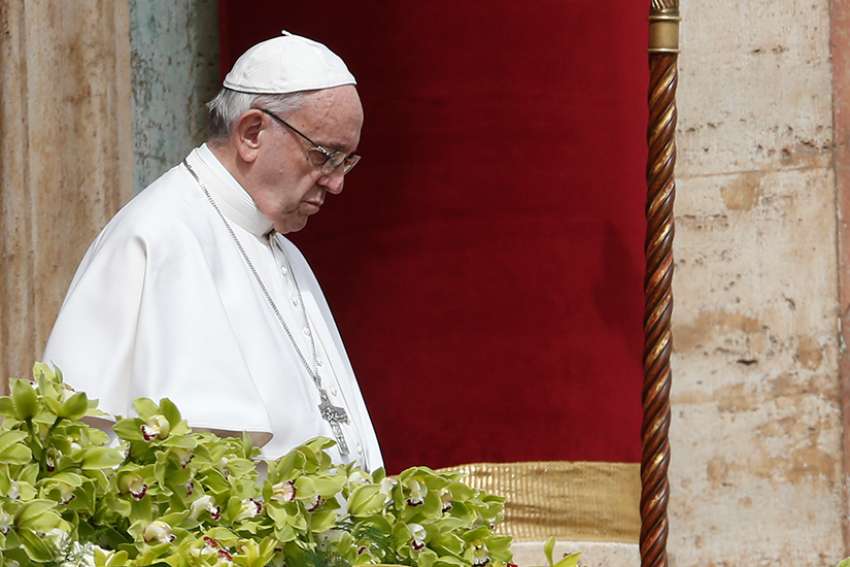In an apostolic exhortation urging joy and exultation and warning of the very real presence of evil in our world, the Pope raises justice for the poor and aid to migrants and refugees up beside the fate of children in the womb.
“Our defence of the unborn, for example, needs to be clear, firm and passionate, for at stake is the dignity of human life, which is always sacred,” Pope Francis writes in Gaudete et Exsultate (“Rejoice and Be Glad”), a 20,000-word explanation of the universal call to holiness released April 9.
“Equally sacred, however, are the lives of the poor, those already born, the destitute, the abandoned and the underprivileged, the vulnerable infirm and elderly exposed to covert euthanasia, the victims of human trafficking, new forms of slavery and every form of rejection.”
Pope Francis particularly urges Catholics to welcome refugees and migrants.
“Some Catholics consider it a secondary issue compared to the ‘grave’ bioethical questions,” he writes. “That a politician looking for votes might say such a thing is understandable, but not a Christian, for whom the only proper attitude is to stand in the shoes of those brothers and sisters of ours who risk their lives to offer a future to their children.”
For Canadian parishes that have sponsored thousands of refugees and supported the work of Canadian Catholic Organization for Development and Peace among refugees and displaced people around the globe, the Pope may be preaching to the converted. But we’re not converted if we’re not joyful, said Western University’s King’s College philosophy professor John Heng.
“It’s an exhortation to first of all be mindful — to be humble in other words — before God,” Heng told The Catholic Register hours after Gaudete et Exsultate was released in Rome. “To recognize that God is always with us, helps us and sustains us, and gives us the resources to reflect Him and live a life in union with Him.”
Heng plans to share with his students the Pope’s advice on discernment.
“That’s what I feel students need nowadays,” he said. “Especially with all the anxieties they have about ‘What am I going to do with my life’ and all the pressures that they’re feeling from their peers. That call to continuous, daily discernment is so important.”
In the context of his advice on discernment, Pope Francis speaks of the concrete reality of evil.
“We should not think of the devil as a myth, a representation, a symbol, a figure of speech or an idea,” the Pope writes. “This mistake would lead us to let down our guard, to grow careless and end up more vulnerable. The devil does not need to possess us. He poisons us with the venom of hatred, desolation, envy and vice. When we let down our guard, he takes advantage of it to destroy our lives, our families and our communities.”
The Pope turns to the bishops of Canada to help him make a point about our need for a brand of charity that includes justice.
“Even if helping one person alone could justify all our efforts, it would not be enough. The bishops of Canada made this clear when they noted, for example, that the biblical understanding of the jubilee year was about more than simply performing certain good works. It also meant seeking social change,” the Pope writes. He then quotes a 2001 open letter on poverty and exclusion from the Canadian Conference of Catholic Bishops to Members of Parliament: “For later generations to also be released, clearly the goal had to be the restoration of just social and economic systems, so there could no longer be exclusion.”
“It’s a short document and it’s a rich document,” said McGill University history professor John Zucchi of the exhortation. “It’s a document that leaves less wiggle room for us to keep moving around and holding onto our own ways. I think it’s a challenging document.”
Having included the words “joy” or “happiness” in three magisterial documents (The Joy of the Gospel, Happiness in Love — known better as Amoris Laetitia — and now Rejoice and Be Glad) Zucchi believes Pope Francis has a point to make about joy.
“He’s saying, ‘This is what I want you people to understand for your own joy and happiness.’ We’re kind of drifting away from it constantly with all of these distractions we have. He’s kind of trying to call us back,” Zucchi said.
Pope issues holiness challenge, expands 'pro-life' meaning
By Michael Swan, The Catholic RegisterPope Francis has once again expanded the Catholic definition of being pro-life.
Please support The Catholic Register
Unlike many media companies, The Catholic Register has never charged readers for access to the news and information on our website. We want to keep our award-winning journalism as widely available as possible. But we need your help.
For more than 125 years, The Register has been a trusted source of faith-based journalism. By making even a small donation you help ensure our future as an important voice in the Catholic Church. If you support the mission of Catholic journalism, please donate today. Thank you.
DONATE

